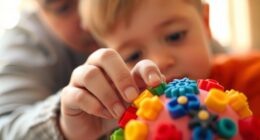As we start on the journey of balancing weight loss goals and breastfeeding, we are faced with the paramount task of nourishing ourselves adequately while shedding extra pounds.
But, have you ever wondered how a balanced diet can play a key role in achieving this delicate equilibrium?
Stay tuned to uncover the secrets of maintaining a healthy diet that supports weight loss without compromising the valuable nutrients needed for best well-being, both for you and your little one.
Key Takeaways
- Consume 450-500 extra calories daily for milk production while balancing nutrients.
- Hydration aids in weight loss and milk production; drink water regularly.
- Eat every 3-4 hours with nutrient-dense foods for sustained weight loss.
- Aim for gradual weight loss (<1.5 lbs/week) with 1,500-1,800 daily calories for milk supply.
Importance of a Balanced Diet
Ensuring a balanced diet is important for new mothers who are breastfeeding as it provides essential nutrients for both themselves and their babies. When it comes to postpartum weight loss, breastfeeding women need around 450-500 extra calories per day to support milk production. This increased calorie requirement can aid in losing weight gradually without compromising the quality or quantity of breast milk.
Balancing the intake of carbohydrates, proteins, and fats is vital for a healthy diet while breastfeeding. Consuming a variety of nutrient-dense foods like fruits, vegetables, whole grains, lean proteins, and healthy fats not only supports weight loss but also ensures that the mother and baby receive adequate nutrition. Additionally, a balanced diet can help in maintaining energy levels, which is crucial for new mothers who are often sleep-deprived and busy caring for their newborns.
Nutrient-Rich Foods to Include

To optimize weight loss and support overall health while breastfeeding, incorporating a variety of nutrient-rich foods in our diet is key. Including fruits, vegetables, whole grains, lean protein, healthy fats, vitamins, minerals, antioxidants, calcium, and fiber can provide the essential nutrients needed during this critical time. Here is a breakdown of these nutrient-rich foods:
| Food Group | Benefits |
|---|---|
| Fruits | Rich in vitamins, minerals, and antioxidants. |
| Vegetables | Provide essential vitamins and fiber. |
| Whole Grains | High in fiber and aid in digestion. |
| Lean Protein | Supports muscle recovery and promotes satiety. |
| Healthy Fats | Essential for overall health and well-being. |
| Calcium | Important for bone health and muscle function. |
Hydration and Weight Loss
Staying well-hydrated plays an important role in promoting weight loss by supporting metabolism and aiding digestion. When focusing on losing weight safely while breastfeeding, hydration becomes even more vital for our bodies.
Here are three key points to take into account:
- Hydration and Calorie Intake: Drinking water before meals can help reduce calorie intake by making us feel fuller, promoting weight loss in a healthy way.
- Dehydration and Hunger Signals: Dehydration can sometimes be mistaken for hunger, leading us to consume unnecessary calories. By staying hydrated, we can better interpret our body's signals and avoid overeating.
- Hydration and Milk Production: Adequate hydration is essential for milk production while breastfeeding. By ensuring we stay hydrated, we support both our body's needs and our baby's nourishment.
To support our postpartum body in its weight loss journey, opting for water as our primary beverage choice can help us stay hydrated and maintain a healthy balance throughout the day.
Meal Frequency and Timing

Maintaining a consistent schedule of smaller, frequent meals throughout the day can positively impact weight loss efforts while breastfeeding by stabilizing blood sugar levels and supporting metabolism. Eating every 3-4 hours can help prevent overeating, keep energy levels stable, and aid in hunger prevention. Skipping meals, especially breakfast, should be avoided as it can lead to increased hunger and poor food choices later on. Starting the day with a balanced meal or snack within an hour of waking up can kickstart metabolism and provide essential nutrients for both the mother and baby. Proper meal timing and frequency play an important role in aiding weight loss while breastfeeding by controlling appetite and avoiding excessive calorie intake.
| Meal Timing and Frequency | Benefits |
|---|---|
| Every 3-4 hours | Stabilizes blood sugar levels |
| Balanced meals/snacks | Supports metabolism |
| Regular eating schedule | Prevents overeating |
Safe Weight Loss Strategies
From understanding meal frequency and timing, safe weight loss strategies for breastfeeding mothers should focus on gradual and balanced approaches to support both maternal health and milk supply.
- Gradual Weight Loss: Aim for a gradual weight loss of less than 1.5 pounds per week to guarantee the maintenance of a healthy milk supply for your baby.
- Caloric Intake: Consume a minimum of 1,500-1,800 calories daily to prevent a decrease in milk supply while still promoting safe weight loss for postpartum mothers.
- Avoid Fad Diets: Steer clear of fad diets and focus on balanced meals that provide essential nutrients to support your health and the quality of your breast milk.
Frequently Asked Questions
What Should a Breastfeeding Mother Eat to Lose Weight?
We focus on consuming nutrient-dense foods like fruits, veggies, whole grains, lean protein, and healthy fats. It's important to include fiber-rich foods for satiety and digestion, along with iron, calcium, and vitamin D sources while limiting processed items.
How to Lose 20 Pounds in a Month While Breastfeeding?
We acknowledge the desire to lose weight quickly while breastfeeding, but it's important to focus on gradual weight loss for health and milk supply. Consult healthcare providers for safe strategies tailored to your needs.
How Can I Lose Fat Fast While Breastfeeding?
We'll focus on gradual weight loss, emphasizing nutrient-dense foods and staying hydrated. Moderate physical activity like walking or yoga can help. Consult healthcare providers for personalized advice. Safe weight loss while breastfeeding is our priority.
What Balanced Diet Should a Breastfeeding Mother Eat?
As breastfeeding moms, we prioritize a balanced diet rich in fruits, veggies, whole grains, lean protein, and healthy fats. Including foods from all groups supports us and our babies. Opt for nutrient-dense choices to aid weight loss.
Conclusion
To sum up, maintaining a balanced diet while breastfeeding is like fueling a car with the right kind of gas – it keeps both you and your baby healthy and thriving.
By focusing on nutrient-rich foods, staying hydrated, and following safe weight loss strategies, you can achieve your goals without compromising milk production or your well-being.
Remember, consult with healthcare professionals for personalized guidance on this journey.
Stay nourished, stay hydrated, and enjoy this special time with your little one.








